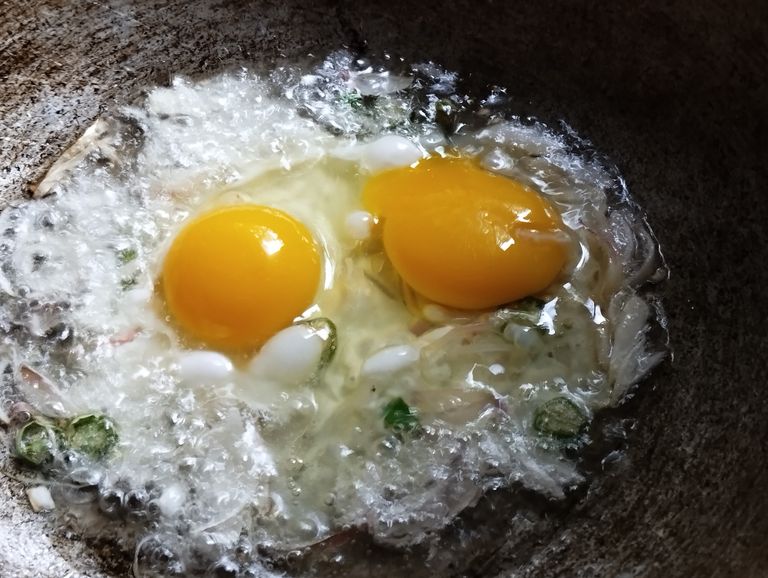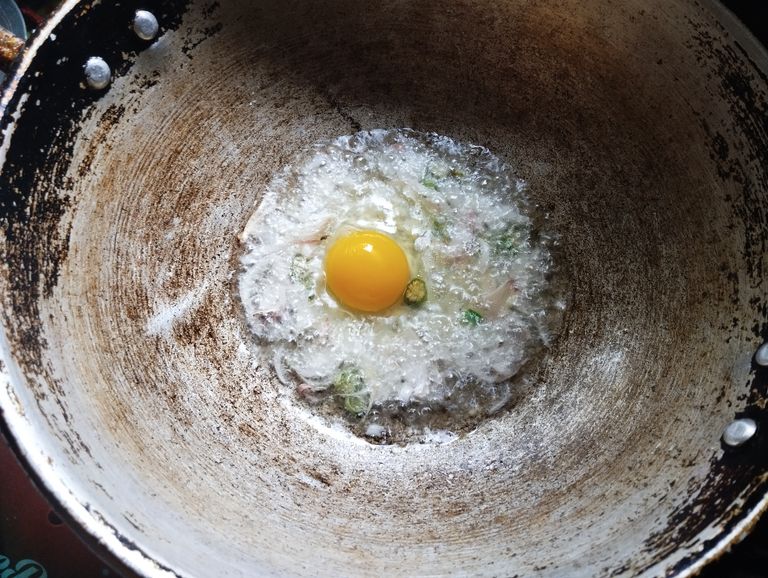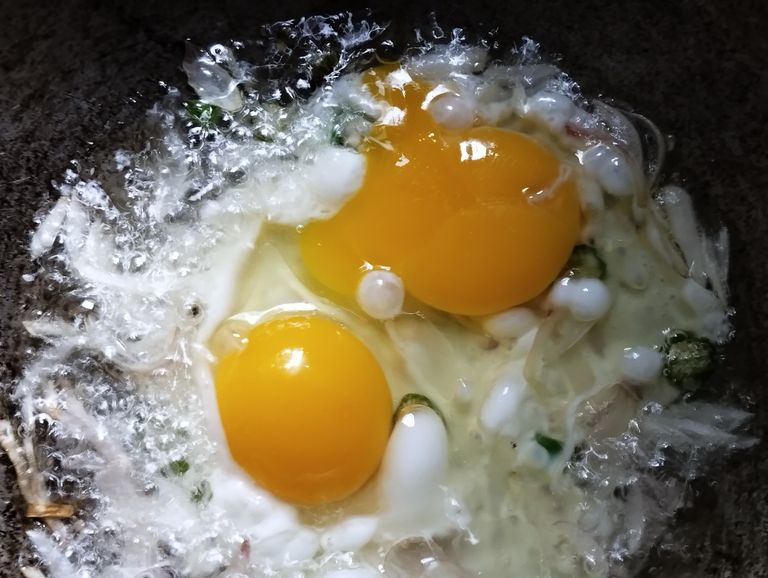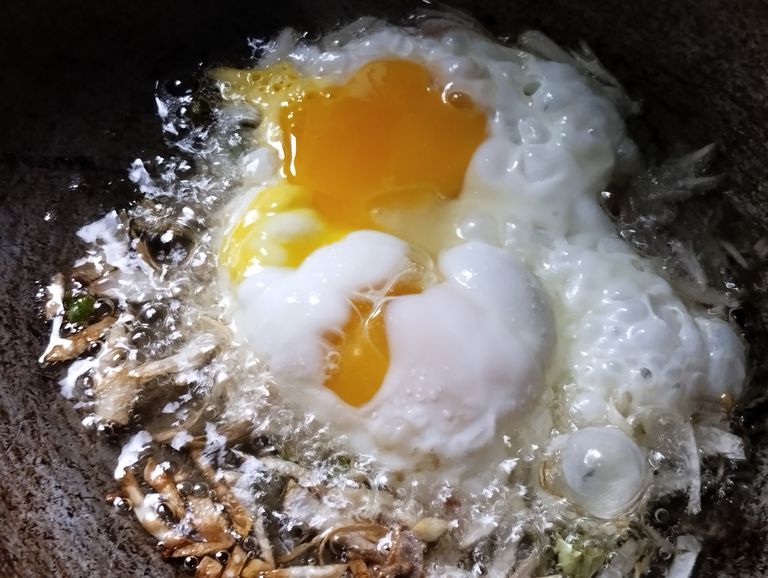
Egg Fry Recipe A Quick and Delicious Dish.
Egg fry, also known as fried eggs, is a simple yet delicious dish that is loved by people all over the world. Whether you’re in a rush or want to enjoy a light meal, this recipe can be prepared in just a few minutes. In this blog, we’ll cover everything you need to know about making the perfect egg fry, including variations to suit your taste.
Why Egg Fry is a Great Choice
Egg fry is not only easy to make but also a great source of protein. It’s versatile, meaning you can enjoy it as a standalone dish or pair it with bread, rice, or vegetables. Whether it’s breakfast, lunch, or dinner, an egg fry is always a satisfying choice.
Ingredients
The best thing about egg fry is that it requires only a few basic ingredients, most of which are already in your kitchen. Here’s what you’ll need:
Eggs: 2 large eggs
Cooking oil or butter: 2 tablespoons
Onion (optional): 1 small, finely chopped
Green chilies (optional): 1-2, finely chopped
Salt: As per taste
Black pepper: A pinch (optional)
Turmeric powder: A pinch (optional for flavor and color)
Fresh coriander leaves (optional): For garnish
Step-by-Step Instructions
- Preparing the Ingredients
Crack the eggs into a bowl and whisk them lightly with a fork. Add a pinch of salt and black pepper for seasoning.
If you prefer a spiced version, mix in turmeric powder or chopped green chilies.
- Heating the Pan
Place a frying pan on medium heat and add 2 tablespoons of oil or butter. Let it heat for a minute.
If you’re using chopped onions, sauté them until they turn golden brown for added flavor.
- Frying the Eggs
Pour the whisked eggs into the pan gently.
Spread the mixture evenly to cover the pan’s surface, ensuring an even fry.
- Cooking and Flipping
Let the eggs cook for 1-2 minutes until the edges start to set.
You can either let it cook as a whole or stir lightly with a spatula for a scrambled texture.
Flip the egg gently if you prefer both sides cooked evenly.
- Garnishing and Serving
Once cooked, transfer the egg fry onto a plate.
Garnish with freshly chopped coriander leaves for an extra touch of flavor.
Serving Suggestions
Egg fry is incredibly versatile and can be paired with various sides to make a complete meal. Here are some ideas:
With Bread: Serve your egg fry with toasted bread and butter for a quick breakfast.
With Rice: Add it as a side dish to steamed rice or fried rice for a fulfilling lunch or dinner.
As a Snack: Roll it in a tortilla or flatbread with some vegetables for a healthy snack.
Tips for the Perfect Egg Fry
Non-Stick Pan: Use a non-stick pan to prevent the eggs from sticking and breaking.
Medium Heat: Cook the eggs on medium heat to avoid burning.
Seasoning: Customize the seasoning to your taste by adding chili flakes, paprika, or garlic powder.
Add Cheese: For a cheesy twist, sprinkle grated cheese on top while the eggs are still hot.
Variations of Egg Fry
- Spicy Egg Fry: Add more chilies and spices for a fiery flavor.
- Vegetable Egg Fry: Mix finely chopped vegetables like carrots, spinach, or bell peppers into the eggs before frying.
- Cheese Egg Fry: Add shredded cheese for a creamy texture.
- Sunny Side Up: Instead of whisking the eggs, fry them directly for a sunny-side-up style.
Why You’ll Love This Recipe
Egg fry is quick, easy, and highly customizable. It’s a dish that beginners can master and experienced cooks can experiment with. Plus, it’s budget-friendly and nutritious, making it an excellent choice for any meal.
So, the next time you’re looking for a simple yet delicious dish, try making an egg fry. It’s a recipe that never disappoints.


The Health Benefits of Eating Boiled Eggs
Boiled eggs are a nutritional powerhouse, packed with essential vitamins, minerals, and high-quality protein. They are one of the simplest yet most effective additions to your daily diet. Whether you’re looking to build muscle, maintain a healthy weight, or support overall wellness, boiled eggs can be an excellent choice. Here’s a detailed look at the numerous health benefits of consuming boiled eggs.
- A Rich Source of High-Quality Protein
Boiled eggs are an excellent source of complete protein, containing all nine essential amino acids. These amino acids are crucial for muscle repair, growth, and overall body function. Just one large boiled egg provides around 6 grams of protein, making it a fantastic option for athletes, fitness enthusiasts, and anyone looking to meet their daily protein requirements.
- Boosts Brain Health
Eggs are rich in choline, a vital nutrient that supports brain development and function. Choline plays a key role in producing acetylcholine, a neurotransmitter essential for memory and learning. Regular consumption of boiled eggs can enhance cognitive function and may reduce the risk of neurodegenerative diseases like Alzheimer’s.
- Promotes Eye Health
Boiled eggs contain two powerful antioxidants, lutein and zeaxanthin, which are known to protect the eyes from harmful blue light and reduce the risk of cataracts and macular degeneration. Additionally, the vitamin A in eggs supports healthy vision and helps prevent night blindness.
- Supports Heart Health
Contrary to popular belief, moderate consumption of boiled eggs does not harm heart health. In fact, the omega-3 fatty acids and HDL (good cholesterol) in eggs help reduce inflammation, improve lipid profiles, and lower the risk of heart disease. Research shows that eating up to one egg daily can be part of a heart-healthy diet.
- Aids in Weight Management
Boiled eggs are low in calories but highly satisfying, making them an ideal food for weight management. The high protein content in eggs keeps you full for longer, reducing overall calorie intake throughout the day. Incorporating boiled eggs into your breakfast can help curb cravings and promote healthy eating habits.
- Strengthens Bones and Teeth
Boiled eggs are a natural source of vitamin D, which is essential for calcium absorption. Calcium is crucial for maintaining strong bones and teeth. Including eggs in your diet can help prevent bone-related conditions like osteoporosis, especially in older adults.
- Enhances Skin, Hair, and Nail Health
The vitamins and minerals in boiled eggs, including biotin, selenium, and zinc, are vital for healthy skin, shiny hair, and strong nails. Biotin, in particular, supports keratin production, which enhances the strength and appearance of hair and nails.
- Provides Energy
Boiled eggs are rich in B vitamins, especially B2 (riboflavin) and B12. These vitamins play a significant role in converting food into energy, ensuring that your body remains active and functional throughout the day.
- Lowers Risk of Anemia
The iron content in boiled eggs is highly bioavailable, making it easier for the body to absorb. Iron is essential for producing hemoglobin, which transports oxygen throughout the body. Regular consumption of boiled eggs can help prevent iron deficiency anemia.
- Easy to Prepare and Versatile
Boiled eggs are incredibly convenient and versatile. They can be eaten on their own, added to salads, or paired with other foods for a balanced meal. Their portability also makes them a perfect snack for people with busy lifestyles.
How Many Boiled Eggs Should You Eat?
While boiled eggs are highly nutritious, moderation is key. Most healthy adults can safely consume 1–2 boiled eggs daily as part of a balanced diet. However, individuals with certain health conditions, such as high cholesterol, should consult their healthcare provider for personalized advice.
Boiled eggs are a nutrient-rich food with countless health benefits. From supporting brain and heart health to aiding in weight management and enhancing skin, hair, and nails, their versatility and convenience make them a must-have in your diet. Whether you’re looking for a quick snack, a protein boost, or a nutrient-packed meal, boiled eggs are an excellent choice for all age groups. Start including boiled eggs in your daily routine and enjoy the benefits of this incredible superfood.


Why Does an Egg Have Two Yolks?
Eggs are a staple food worldwide, but sometimes, nature surprises us with something extraordinary—a double-yolk egg. While discovering two yolks in one egg can feel like a lucky find, it is more than just a rare occurrence. Let’s explore the fascinating reasons behind why an egg might have two yolks.
What is a Double-Yolk Egg?
A double-yolk egg is one in which two yolks are encased within a single eggshell. This happens when a hen releases two yolks into the oviduct (the egg-laying part of the reproductive system) at the same time, and both get surrounded by egg whites and a single shell. While it is not the norm, this phenomenon is entirely natural and occurs under specific circumstances.
Causes of Double-Yolk Eggs
- Young or Inexperienced Hens
Double-yolk eggs are most commonly laid by young hens whose reproductive systems are not yet fully synchronized. In the early stages of egg production, a hen's ovary might release two yolks in quick succession, resulting in a double-yolk egg.
- Genetic Factors
Some breeds of hens, like the Rhode Island Red or Leghorn, are more prone to laying double-yolk eggs due to genetic predisposition. Additionally, individual hens may have a hereditary tendency to produce double-yolk eggs more frequently.
- Hormonal Imbalance
Hormonal fluctuations can cause a hen to release more than one yolk at a time. Stress, dietary changes, or environmental factors can influence hormone levels, leading to this occurrence.
- Age of the Hen
As mentioned earlier, younger hens often lay double-yolk eggs. However, older hens nearing the end of their laying cycles may also produce them, as their egg-laying processes become irregular.
- Diet and Nutrition
Proper nutrition plays a critical role in egg production. Hens fed a diet high in protein and essential nutrients are more likely to maintain healthy reproductive systems. However, certain dietary supplements or overfeeding may sometimes contribute to irregularities, like double-yolk eggs.
Are Double-Yolk Eggs Rare?
Double-yolk eggs are relatively uncommon, with an estimated occurrence of about 1 in 1,000 eggs. However, in some commercial egg production facilities, where young hens dominate the flock, the frequency of double-yolk eggs can increase significantly. Some farms even market these eggs separately due to their novelty and appeal.
Can a Double-Yolk Egg Hatch Two Chicks?
While it is theoretically possible for a double-yolk egg to produce two chicks, it is extremely rare. The confined space within the shell makes it challenging for both embryos to develop fully. In most cases, neither embryo survives, as there is insufficient room and resources for proper growth.
Are Double-Yolk Eggs Safe to Eat?
Yes, double-yolk eggs are entirely safe to consume and are just as nutritious as regular eggs. In fact, some people consider them a treat due to their rarity and the higher proportion of yolk, which is rich in vitamins, minerals, and healthy fats.
Cultural Beliefs and Superstitions
In many cultures, finding a double-yolk egg is considered a sign of good luck. It is often associated with positive events such as fertility, prosperity, or an upcoming celebration. While these beliefs lack scientific basis, they add to the charm of discovering a double-yolk egg.
How to Identify a Double-Yolk Egg
Without cracking an egg, it’s challenging to know if it has two yolks. However, double-yolk eggs are usually larger and heavier than single-yolk eggs. Candling, a method where light is shone through the egg to reveal its contents, can help identify double-yolk eggs before they are opened.
Double-yolk eggs are a delightful quirk of nature, arising from the complexities of a hen’s reproductive system. While they are rare, they are perfectly natural and safe to eat. Whether you view them as a lucky find or a biological marvel, double-yolk eggs remind us of the wonders of nature and its unpredictable beauty. So, the next time you crack open an egg and find two yolks, savor the moment—it’s a small yet extraordinary gift from nature.

At What Age Do Domestic Ducks Start Laying Eggs?
Domestic ducks, often referred to as farm ducks or backyard ducks, are known for their eggs, meat, and charming personalities. For anyone raising ducks, one of the most exciting milestones is the first egg. But at what age do domestic ducks start laying eggs? Let’s dive into the factors that influence egg-laying in ducks, along with tips for optimizing their productivity.
Average Age for Egg-Laying
On average, most domestic ducks begin laying eggs at around 5 to 7 months of age (20 to 30 weeks). This can vary depending on the breed, environment, and overall health of the ducks. Some breeds are known for earlier maturity and higher egg production, while others may take a bit longer.
Factors Influencing Egg-Laying Age
- Duck Breed
Certain breeds are specifically bred for egg production, and they start laying earlier than meat or ornamental breeds.
Popular egg-laying breeds like Khaki Campbell and Indian Runner ducks can start laying as early as 4 to 5 months. These breeds are prolific layers, producing up to 300 eggs per year.
Larger breeds like the Pekin duck, primarily raised for meat, may take up to 7 months to begin laying and generally produce fewer eggs.
- Nutrition
Proper nutrition is critical for early and consistent egg-laying. A high-protein starter feed (18-20%) for ducklings should be provided during the first few weeks.
As ducks approach maturity, switch to a layer feed containing 16-18% protein, calcium, and essential vitamins to support egg production.
- Daylight Hours
Ducks are sensitive to daylight. They typically require 14-16 hours of light per day to stimulate egg production.
In winter or shorter daylight months, using artificial lighting in their coop can encourage laying.
- Environment
A stress-free environment is essential for ducks to start and maintain egg production. Ensure they have a clean, safe, and predator-free living space.
Access to water for drinking and bathing is also crucial, as ducks are waterfowl and thrive in aquatic environments.
- Health and Genetics
Healthy ducks are more likely to start laying on time. Regular health checks and vaccinations can prevent delays caused by diseases or malnutrition.
Genetics also play a role; ducks from good breeding stock are more likely to lay earlier and produce consistently.
Signs a Duck Is About to Lay Eggs
As ducks approach maturity and begin to lay eggs, you may notice the following signs:
Nesting Behavior: They may start exploring nesting boxes or creating makeshift nests.
Larger, Reddened Vent: The vent area (cloaca) becomes more prominent and reddened as they prepare for egg-laying.
Vocalization Changes: Ducks may become more vocal or exhibit different behaviors indicating maturity.
Body Condition: They may appear fuller or rounder, especially in the abdomen.
Maximizing Egg Production
- Provide Adequate Nesting Boxes
Each duck should have access to a nesting box filled with clean straw or wood shavings. Aim for one nesting box for every 2-3 ducks.
- Ensure Proper Lighting
If natural light is insufficient, provide supplemental lighting to maintain the required 14-16 hours of light.
- Maintain a Balanced Diet
Include oyster shells or other calcium supplements to strengthen eggshells.
- Minimize Stress
Keep their environment calm and free from disturbances like loud noises or sudden changes.
Seasonal Variations in Egg-Laying
It’s important to note that ducks may naturally reduce or stop laying eggs during winter or periods of molting (when they shed old feathers and grow new ones). This is a normal process, and their egg-laying typically resumes with better weather or after the molt.
Domestic ducks usually start laying eggs between 5 to 7 months of age, depending on their breed, nutrition, and living conditions. By providing a healthy environment, proper diet, and adequate lighting, you can ensure that your ducks begin laying on time and remain productive throughout their laying period. Whether you're raising ducks for eggs or as pets, patience and care will reward you with delicious, nutritious eggs and happy, healthy ducks.